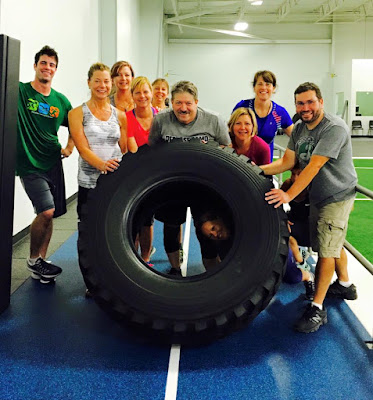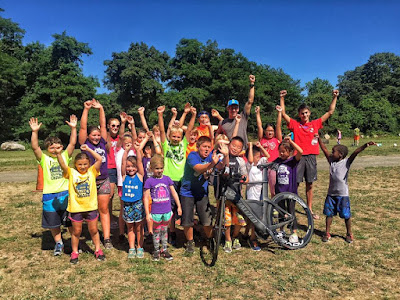I have had the honor of working at my 5th
Diabetes Training Camp (DTC) this August and I absolutely loved it. Working with Type 1 diabetics is extremely fulfilling and watching the DTC philosophy at work in the camp environment is a powerful experience.
For those of you who don’t know, Type 1 diabetes is an
autoimmune disease where a person’s pancreas stops working. Normally, a properly working pancreas secretes insulin which helps us regulate our blood sugar. Since
a diabetic’s pancreas does not work properly, the diabetics must consciously regulate
their own blood sugar by injecting insulin at the right times throughout the
day. It’s a 24 hour, 7 days a week job and there is no cure (you can’t simply eat
or exercise your way out of it). If diabetics do not regulate their blood
sugars well, there can be short term consequences (like feeling lethargic or passing
out) and long term consequences such as permanent nerve damage, loss of eye
sight, and shorter life expectancy.
Generally, diabetics get a 20-30 minute consult with their
doctor a few times a year. Dr. Matt Corcoran, an MD, CDE, and Exercise
Specialist with the American Association of Sports Medicine quickly recognized
that this was not enough time to help his patients. In response, he developed a
camp to address the needs of diabetics in a fundamental way. This is how DTC
was born.
 |
| Dr. Matt Corcoran with Camper Margalynne |
At the most basic level, DTC is a week long educational camp
that helps diabetics improve their diabetes management through nutrition and exercise. The camp brings
together all the necessary team members including a medical team, a mental
skills team, a coaching team, and a fitness team to address all aspects of living
well with diabetes. The campers listen to lectures given by experts, engage in one-on-ones
to develop individualized diabetes and exercise/training plans, have coach
directed group discussions, and then go out to the fields (and pools) of Lancaster
County PA to apply what they learned. The camp does a fantastic job of addressing
everyone’s individual goals, from those who want to be able to walk a mile or
swim one length of a pool to those want to run a marathon or complete an
ironman.
Naturally, my job at DTC is to be part of the coaching staff. I help out with the swim, bike, and run/walk programs on an as needed bases: working with other coaches to develop the week’s program; discussing swim, bike, run techniques with campers; observing group training sessions; coaching on deck; and providing individuals with good old fashion workouts. I am also around to address individual questions and take part in the coach directed discussion groups. This year, I even helped some campers/staff work on their butterfly kick in the pool (which seconds as a cool dance move and thirds as…well…we won’t go there…).
From my perspective, one of the most powerful things about DTC is the low risk environment it creates. At camp, it becomes markedly evident that there is not a “one plan that fits all” formula. There is not one plan that will resolve everyone’s diabetes needs and/or fitness goals. There are 25 different diabetics in the room with 25 different body’s that all respond to stress, insulin, sugar, and training differently. The lectures provide some very general principles and then everyone must go out, test their knowledge, and find out what works for them. Inevitably, a camper calculates incorrectly, or the body responds in a way he or she didn’t expect, or the meter wasn’t reading accurately, and he or she goes super high or low during a workout. The thing is, it’s ok. The campers are not alone in the DTC environment and can test out their new knowledge in a safe way. Not only is there a medical team ready to intervene when necessary, all the other campers can identify with the one who is having a tough time. They can empathize with each other, share their experiences, and build each other back up during the tough times. Needless to say, campers learn from each other just as much as they learn from the experts.
 |
| Getting Fit! Having Fun! |
I have often wondered why I am so drawn to DTC beyond the fact that I’m a Professional Coach/Triathlete and can fill a coaching role. Although type 1 diabetes runs in my family, I do not have it. It’s taken me a few camps to figure this out, but I think it has to do with how the essence of DTC aligns with my philosophy of living as an athlete. For me, being an athlete is a life approach. It requires a relentless awareness of your own body, mind and environment. It requires an unwavering desire to live and adapt, rest and grow. DTC teaches these principles in a concrete way. It presents campers with good evidence-based information about the body, mind, and environment through a variety of different angles (medicine, psychology, nutrition, fitness). DTC goes beyond this by creating an individualize plan to support each individual’s body, needs, and goals. Then, it creates a low risk environment that allows campers to go out and live, to learn from their experiences, to trust their experiences, to share those experiences with others, to tweak their plan, to keep growing, and to never give up.
 |
| Technique Focus |
Campers who leave DTC tend to be very successful with their
goals. Countless campers have gone on to achieve extraordinary feats that doctors
never thought possible for a diabetic. These feats range from getting
off the couch and running a 5k just 8 weeks later, to completing the grueling 140.6
miles of an ironman, to riding a bike for 400 miles over 40 days over 40,000
feet of elevation while raising $40,000 for to DTC foundation after living with
diabetes for 40 years (GO RIDE 40!). This is because DTC not only sets campers
up to successfully manage their diabetes, it teaches people how to address their
limitations and be successful in life. The camp essentially parallels a high
performance environment, the same environment that great coaches like Brett Sutton,
Joel Filliol, Greg Mueller, Cliff English, Marilyn Chychota, and Paulo Sousa
(among countless others) create for their high performing triathletes. I would
be lying if I said I do not try to create this same type of experience for the
athletes I coach individually. Despite the fact that many Power On athletes live far away, I
attempt to disperse evidence-based information through my closed Power On
Coaching Facebook Page. I connect athletes within my coaching group and with nearby
clubs such as the YMCA-C3 Triathlon Club, Pittsburgh Triathlon Club, and Masters
Swimming so they can train with other athletes and learn from other’s
experiences. I develop individualized training plans to help guide each
athlete. I help each athlete reflect on their experiences via data analysis, goal
sheets, post-race reviews, and end of the season reflections so they can learn
to tweak their plan and find a way to be more successful in the future. I also take
part in these things myself to develop my own professional career because I
want to be a better coach and pro triathlete. To sum it up, the types of things
that campers learn and work on at DTC are the same things that top performers are
doing all over the world. The only difference is that campers at DTC all have
a specific set of limitations which the camp sets out to address.
 |
| Ride 40's Grant Curry, a HUGE Success |
If you have type 1 diabetes, you must go to DTC. Regardless of where you are at in your journey of living with the disease, and regardless of your current fitness level, your experience will be life changing. I’ve seen countless cases of “oh, I didn’t know I could do that” or “wow, I’ve had diabetes for 30 years and I’ve never had so much control over my blood sugar until this week.” Not only that, you will inspire other diabetics by sharing your story.
 |
| Julie and Lyndsay, both are Diabetics, both are Ironman finishers, and both are Exceptional Women |
If you do not have diabetes, you can still embody the idea of living as an athlete. No matter where you are starting from, find a good group of training partners and/or
a good coach to help you achieve your goals.
I could not thank DTC enough for having me back again and
again. With each camp, I become a better coach, a better athlete, and a better
person. Thank you DTC!
 |
| The August 2016 DTC Crew! |
 |
| Runners Run...and then Pose |
For more info on the Diabetes Training Camp, give a
life changing gift to the DTC foundation, or find out how you can get funding for the next DTC camp, go here: http://diabetestrainingcamp.com/
















